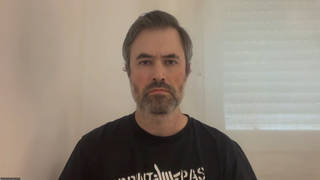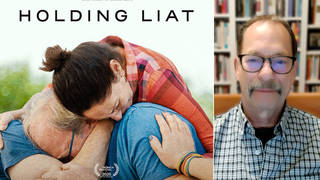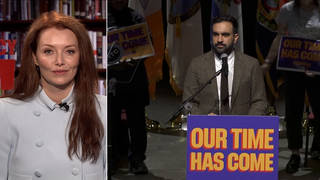
Guests
- Frank Schaefferauthor of several books, including Sex, Mom, and God and Crazy for God: How I Grew Up as One of the Elect, Helped Found the Religious Right, and Lived to Take All (or Almost All) of It Back. He recently wrote for AlterNet an article titled “Michele Bachmann Was Inspired by My Dad and His Christian Reconstructionist Friends — Here’s Why That’s Terrifying.”
We speak with a former evangelical Christian, Frank Schaeffer, whose father’s writings and work played a key role in the religious development of Republican presidential candidate Michele Bachmann. Frank Schaeffer recently wrote an article titled “Michele Bachmann Was Inspired by My Dad and His Christian Reconstructionist Friends — Here’s Why That’s Terrifying.” Schaeffer’s father was Francis Schaeffer, one of the nation’s most influential evangelical Christian theologians and philosophers in the 1970s and 1980s. In a recent profile in The New Yorker magazine, Bachmann reveals she entered politics after watching Francis Schaeffer’s film, “How Should We Then Live?” The film was directed by his son, Frank, our guest today. “[Bachmann] doesn’t just come from the far right of evangelical politics. She comes from a fringe even of the fringe, which is the Reconstructionist, Dominionist movement,” Schaeffer says. “The religious right that I was part of is fundamentally anti-American. They hate this country. They wrap themselves in the flag, but they hate America as it is.” [includes rush transcript]
Transcript
AMY GOODMAN: As we continue looking at some of the Republican presidential candidates, we’re joined by a former Christian evangelical whose father’s writings and work played a key role in Congress Member Michele Bachmann’s religious development. Our guest is Frank Schaeffer. He recently wrote a piece called “Michele Bachmann Was Inspired by My Dad and His Christian Reconstructionist Friends — Here’s Why That’s Terrifying.”
Schaeffer’s dad was Francis Schaeffer, one of the nation’s most influential evangelical Christian theologians and philosophers in the ’70s and ’80s.
In a recent profile in The New Yorker magazine, Michele Bachmann reveals she entered politics after watching Francis Schaeffer’s film How Should We Then Live? The film was directed by his son Frank, our guest today. Frank Schaeffer joins us from Boston, the author of several books, including Sex, Mom, and God and Crazy for God: How I Grew Up as One of the Elect, Helped Found the Religious Right, and Lived to Take All (or Almost All) of It Back.
Frank Schaeffer, welcome to Democracy Now! Talk about, well, Michele Bachmann and her relationship with your father, how she has felt about his teachings.
FRANK SCHAEFFER: Well, when she was at Oral Roberts Law School, founded by someone called Herb Titus, who then went on and worked for Pat Robertson and the 700 Club and founded a law school for him, she was unwittingly being trained by one of my father’s closest disciples who had been at his ministry many times. And Herb Titus and my dad and people like Rousas Rushdoony and other founders of the Reconstructionist movement, or the Dominionists, because they want to take dominion over the earth, including American politics, really believe that the U.S. Constitution and Bill of Rights should be replaced by what they regard as biblical law.
So what people have to understand about Michele Bachmann, and that I talk about in my book Sex, Mom, and God, is that she doesn’t just come from the far right of evangelical politics. She comes from a fringe even of the fringe, which is the Reconstructionist, Dominionist movement, that honestly, in the best of all worlds, as far as they’re concerned, would replace American democracy with a theocracy on a Christian level that would mirror something like modern-day Iran after it fell to the Ayatollah Khomeini.
AMY GOODMAN: At last week’s Republican presidential debate, Byron York of the Washington Examiner asked Michele Bachman about her relationship with her husband.
BYRON YORK: In 2006, when you were running for Congress, you described a moment in your life when your husband said you should study for a degree in tax law. You said you hated the idea. And then you explained, quote, “But the Lord said, 'Be submissive. Wives, you are to be submissive to your husbands.' As president, would you be submissive to your husband?”
REP. MICHELE BACHMANN: Thank you for that question, Byron.
BYRON YORK: You’re welcome.
REP. MICHELE BACHMANN: Marcus and I will be married for 33 years this September 10th. I’m in love with him. I’m so proud of him. And both he and I—what submission means to us, if that’s what your question is, it means respect. I respect my husband. He’s a wonderful, godly man and a great father. And he respects me as his wife. That’s how we operate our marriage. We respect each other. We love each other. And I’ve been so grateful that we’ve been able to build a home together. We have five wonderful children and 23 foster children. We’ve built a business together and a life together. And I’m very proud of him.
AMY GOODMAN: That was Michele Bachmann in the Republican debate. Frank Schaeffer, can you explain this whole issue of submission?
FRANK SCHAEFFER: Yeah, sure.
AMY GOODMAN: You wrote a piece called “Are Michele Bachmann’s Views about 'Christian Submission' Even More Extreme than She’s Letting On?”
FRANK SCHAEFFER: Yeah, that piece is on AlterNet right now, and I wrote it because, actually, what you just heard Michele Bachmann say there was a well-rehearsed, planned, bare-faced lie. In 2006, she made it very clear she went into law school because her husband told her to. She ran for politics because her husband told her to. And she used the word “submission.”
You have to understand, in the evangelical circle she comes from, there’s a whole movement called the Quiverfull movement, which is about having a full quiver of children, no birth control, lots of kids, five kids, 24 foster kids, whatever—homeschooling, train your kids at home, take them out of the public school system. She’s been in this movement for more than 20 years. And my father and people like Herb Titus and the other people who influenced her helped form that movement. In that movement, wifely submission is an Old Testament principle of absolute misogyny that puts the husband at the head of the house in the most traditional sense. And that’s what she’s been part of.
Now, with a wink and a nod to her own audience watching her on Fox Television, she’s basically saying this: “Look, you know that I know that you know that when I say “wifely submission,” that’s the world I come from. However, we’re trying to win a national election here, so I’m going to soft-pedal this.” And, of course, they’ll let her get away with this godly lie for the greater good, which is to insinuate herself into mainstream American politics as a radical anti-feminist coming from the far right fringe of even the evangelical movement. There are lots of evangelicals that don’t sign onto her view on so many issues, and this would be one of them. But for purpose of the election and thinking forward to maybe getting the nomination from the Republicans, she has to tell these well-rehearsed lies to somehow soft-pedal this extreme background she comes from.
AMY GOODMAN: I want to talk about Michele Bachmann’s views on homosexuality and same-sex marriage. These are the comments she made in 2004.
STATE SEN. MICHELE BACHMANN: This May, homosexual and lesbian activists who live here in Minnesota will be able to travel to Massachusetts to have their same-sex relationships declared marriages by the state of Massachusetts. Upon returning here to Minnesota, they will be able to demand legal recognition through our state court system. And at that point, an activist judge could very well rule in their favor and then strike down Minnesota’s current Defense of Marriage law. If we allow this to happen, group marriage, polygamy, and things much worse may not be far behind.
AMY GOODMAN: That was Michele Bachmann in 2004. Frank Schaeffer?
FRANK SCHAEFFER: Well, look, you know, I spend the whole of my book Sex, Mom, and God basically following several themes, and one of them is that if you believe in the, quote, “inerrancy of Scripture” — in other words, it is without error; everything it says is true, historically, geologically, scientifically, sociologically, scientifically, and every other way — then you have signed onto a Bronze Age myth. And one of the primary tenets of that myth is a misogynistic view of women, and also a view of gay people, which puts them outside of the mainstream of just human existence. And so, you have her husband trying to pray away the gay through his counseling services and so forth.
Again, mainstream U.S. America doesn’t understand that people like Michele Bachmann have signed onto Bronze Age mythology, including its misogyny, its homophobia, its racism, and all the rest of it, and that that is the religion they are part of. When it comes to politics, they try to dress that up, downplay certain things, omit other things, and bare-face lie about some things like the submission issue. But the misogyny, the homophobia, that is at the core of the Bible, which they hold up as the, quote, “word of God,” which, in their view of politics, coming out of the Reconstructionists, should take over the laws of this country at some point, which is what they’re all pushing for when they talk about taking America back, taking America back for God. What they really want to return to is the Bay State colonies under Governor Winthrop, and that’s their ideal society, plus maybe modern medicine, so they can live a little longer and get their prostates checked, etc., etc. But essentially, we’re looking at people whose best of all worlds is the Bronze Age in the state of Israel, back in the day when someone lost their virginity, so they would be stoned to death in the gates of their father’s house. This is the book they’ve signed onto.
AMY GOODMAN: Frank Schaeffer, in Ryan Lizza’s piece in The New Yorker about Michele Bachmann, he writes that Francis Schaeffer “was a tremendous philosopher,” according to Bachmann, quoting. Bachmann said, “He wrote marvelous books and was very inspirational.” Again, Francis Schaeffer is your father. Talk more about where you come from, because you embraced what your father believed. You, yourself, were a well-known evangelical leader—
FRANK SCHAEFFER: Right.
AMY GOODMAN: —before you, well, turned against it all.
FRANK SCHAEFFER: Well, you know, my own journey is one where I had to confront the fact that we were simply wrong on a whole number of issues. And this began in 1984 when my dad died. And like some North Korean despot, I was becoming his sidekick. You know, evangelicals and the North Korean government have this same idea, and that is that fathers pass on the mantle to their sons or families, or at least the mailing list. I was following in my dad’s footsteps, as someone in my young twenties. But from about 1984 on, and certainly by 1990, I had jumped ship.
And I guess I can just put it this way: it struck me, in many areas, but one principally in terms of politics, that the religious right that I was part of is fundamentally anti-American. They hate this country. They wrap themselves in the flag, but they hate America as it is: the America that embraces gay people, is multicultural, is a homogeneous society that seeks to incorporate all races and ethnic creeds into its culture. The America they love is the, quote, “Christian America” that they keep harping back to, that people like Rick Perry, Michele Bachmann, Sarah Palin, George W. Bush, etc., all want to take us back to. But it’s an America that never existed and certainly doesn’t now. And I think it was just that sense of alienation from my own culture, my own time and place, that began a train of thought that, in the end, took me very, very far away, as I explain in Sex, Mom, and God and give the reasons for my departure there. But in a nutshell, it’s just I happen to not be an anti-American person.
And I think that really what people would have to begin to understand is that the language of the right, where they’ve talked about patriotism and the past and so forth, really turned against them would be appropriate, because it’s that basic lack of patriotism that does not like the laws of the country, so it tells people to revolt. This flirtation with secessionism that people like Rick Perry and Sarah Palin’s husband have played with, these sort of violent overtures saying, you know, “We would know what to do with the chairman of the Fed in Texas: we’d treat him rough” kind of stuff, you know, this is the language of people who are unpatriotic, essentially hate their country, want to defund the U.S. government completely, and in the best of all worlds, would literally overthrow our system of government.
AMY GOODMAN: Well, Frank Schaeffer, I want to thank you for being with us. We will speak again soon. Frank Schaeffer is author of Crazy for God: How I Grew Up as One of the Elect, Helped Found the Religious Right, and Lived to Take All (or Almost All) of It Back. He also directed the film How Should We Then Live?: The Rise and Decline of Western Thought and Culture, that has so inspired Michele Bachmann.












Media Options